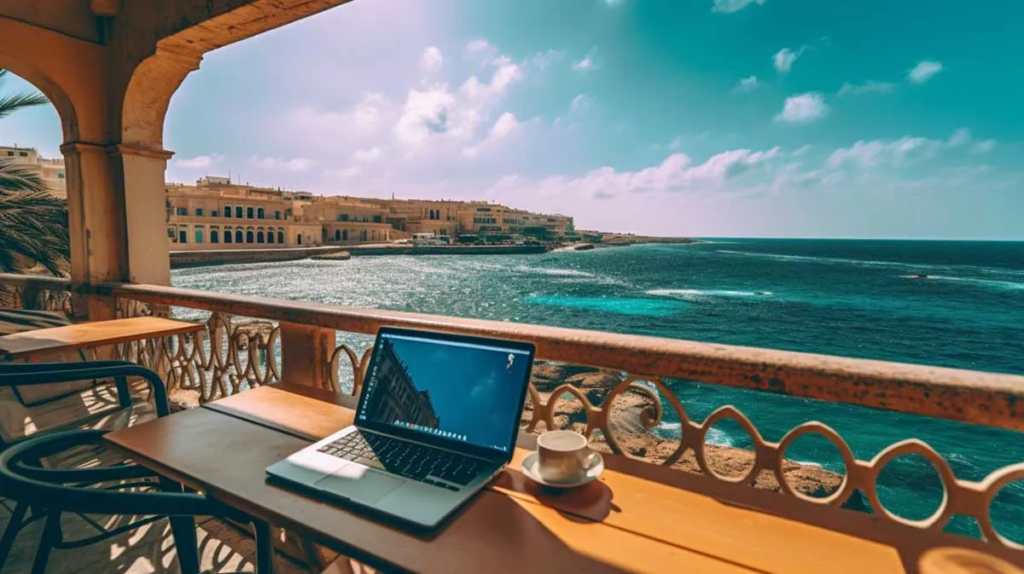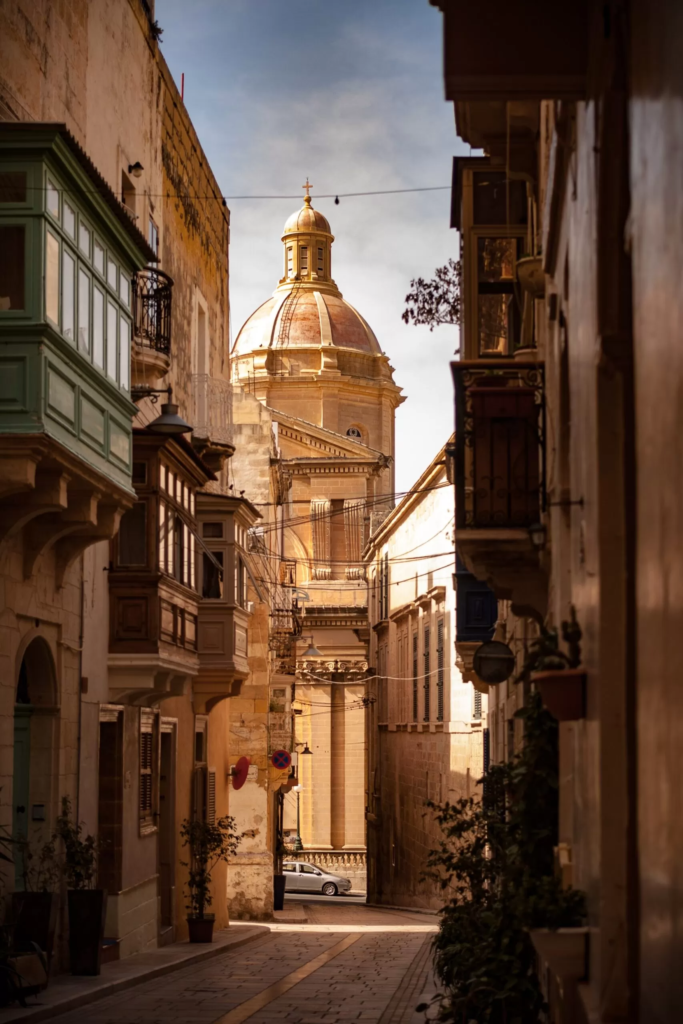Malta, a stunning Mediterranean archipelago, has long been a favored destination for travelers seeking sun, sea, and history. But in recent years, this small island nation has also become a hotspot for digital nomads—those who can work remotely and choose to live in a country that offers both lifestyle and professional benefits. In 2021, Malta launched its Digital Nomad Visa, a program designed to attract remote workers from around the world. This guide provides an in-depth look at the Malta Digital Nomad Visa, including eligibility criteria, the application process, benefits, and some essential tips for making the most of your time in Malta.
Why Choose Malta for Digital Nomad Life?

Before diving into the specifics of the visa, it’s important to understand why Malta is an ideal destination for digital nomads. Here are some compelling reasons:
- Strategic Location: Malta is located at the crossroads of Europe, North Africa, and the Middle East. This makes it an excellent base for travelers looking to explore these regions.
- English-Speaking Country: English is one of Malta’s official languages, making it easy for most international digital nomads to communicate and navigate daily life.
- High Quality of Life: Malta offers a high standard of living, with excellent healthcare, a vibrant cultural scene, and a favorable climate with over 300 days of sunshine per year.
- Thriving Expat Community: The island is home to a large and diverse expat community, including many digital nomads. This creates opportunities for networking and socializing with like-minded individuals.
- Safety: Malta is one of the safest countries in Europe, with low crime rates and a welcoming atmosphere.
Read also Discover Greece: 10 Must-Visit Cities for an Unforgettable Trip
Understanding the Malta Digital Nomad Visa

Malta Digital Nomad Visa is a temporary residence permit that allows non-EU/EEA/Swiss nationals to live and work in Malta while being employed by a company registered abroad or running their own business. The visa is part of Malta’s broader strategy to attract skilled professionals and boost its economy by leveraging the growing trend of remote work.
Eligibility Criteria
To qualify for the Malta Digital Nomad Visa, applicants must meet the following criteria:
- Remote Work: Applicants must prove that they can work remotely using telecommunications technology. This can include:
- Being employed by a company registered outside of Malta.
- Conducting business activities for a company registered abroad (e.g., freelancers or consultants).
- Being a partner or shareholder in a company registered abroad.
- Minimum Income: Applicants must demonstrate a monthly gross income of at least €2,700. This is to ensure that they can support themselves without relying on local resources.
- Health Insurance: Applicants must have health insurance that covers them in Malta.
- Accommodation: Proof of accommodation in Malta, such as a rental agreement or property purchase, is required.
- Good Standing: Applicants must not have a criminal record and must be able to prove that they are in good standing in their home country.
- Valid Passport: A passport valid for the duration of the stay in Malta is essential.
Keep reading : Portugal Nomad Visa: Who is Eligible and How to Apply
Application Process

The application process for the Malta Digital Nomad Visa is relatively straightforward but requires careful attention to detail. Here’s a step-by-step guide:
- Gather Documentation: Before applying, ensure you have all the necessary documents, including:
- A copy of your valid passport.
- Proof of employment or business ownership outside of Malta.
- Evidence of income (e.g., bank statements, pay slips).
- Health insurance policy covering your stay in Malta.
- Proof of accommodation in Malta.
- A clean criminal record certificate.
- Submit the Application: Applications can be submitted online through the Residency Malta Agency website. Ensure that all documents are in English or accompanied by a certified translation.
- Pay the Fees: There is a non-refundable application fee of €300. This fee covers the processing of your application.
- Wait for Approval: Once your application is submitted, it will be reviewed by the Residency Malta Agency. The processing time typically takes around 30 days.
- Travel to Malta: Upon approval, you will receive your visa, which allows you to enter Malta. Once in Malta, you will need to attend an appointment at the Residency Malta Agency to finalize your residence permit.
- Obtain Your Residence Permit: After the appointment, you will receive your residence permit, which is valid for one year and can be renewed annually.
Suggested : Digital Nomad Visa for Spain: Everything You Need to Know
Benefits of the Malta Digital Nomad Visa

The Malta Digital Nomad Visa offers several advantages for remote workers:
- Flexibility: The visa allows you to live in Malta while continuing to work for your employer or run your business abroad. You are not tied to a specific job or employer within Malta.
- Tax Efficiency: Malta offers favorable tax conditions for digital nomads. As long as you do not work for a Maltese company or provide services to local clients, your income is not subject to Maltese tax. However, tax obligations in your home country may still apply.
- Access to EU Travel: While the visa does not grant you the right to work in the EU, it allows for visa-free travel within the Schengen Area for short stays.
- High Quality of Life: Malta’s excellent healthcare, education, and infrastructure make it an attractive destination for long-term living.
- Community and Networking: Malta has a growing community of digital nomads and expats, providing ample opportunities for networking and social activities.
- Beautiful Environment: From historic sites to stunning beaches, Malta offers a rich cultural experience and natural beauty that enhance the quality of life.
Statistics and Numbers
- Digital Nomad Population: While exact numbers are difficult to ascertain, it is estimated that there are thousands of digital nomads living in Malta at any given time. The country’s appeal to remote workers has grown significantly since the introduction of the Digital Nomad Visa.
- Cost of Living: The cost of living in Malta varies depending on lifestyle and location. On average, a single person can expect to spend around €2,500-€3,000 per month, including rent, utilities, food, and entertainment. However, this can vary greatly depending on whether you live in a central location like Valletta or in a more rural area.
- Internet Connectivity: Malta has a well-developed telecommunications infrastructure. The average internet speed in Malta is around 100 Mbps, with widespread availability of fiber-optic broadband.
- Healthcare: Malta’s healthcare system is ranked among the best in the world. As a digital nomad, you are required to have health insurance, but you can also access Malta’s public healthcare services, which are available to residents.
- Safety: Malta is one of the safest countries in Europe, with a crime rate significantly lower than the EU average. This contributes to its popularity among digital nomads and expats.
Tips and Advice for Digital Nomads in Malta

- Choose Your Location Wisely: Malta is a small country, but it offers a variety of living environments. Valletta, the capital, is a bustling city with a rich history and vibrant nightlife. Sliema and St. Julian’s are popular among expats for their modern amenities and proximity to the sea. If you prefer a quieter lifestyle, consider the villages in the interior or the smaller islands of Gozo and Comino.
- Budget Accordingly: While Malta is relatively affordable compared to many Western European countries, it’s still important to budget carefully. Rent in popular areas can be high, and dining out regularly can add up. Look for local markets and budget-friendly eateries to keep costs down.
- Get Involved in the Community: Joining digital nomad groups and attending local events can help you build a network and make friends. There are several coworking spaces in Malta that offer not just a place to work but also opportunities to meet other remote workers.
- Explore the Islands: Don’t limit yourself to just one part of Malta. Take the time to explore the different regions, including the islands of Gozo and Comino. Each area has its own unique charm and attractions, from ancient temples to crystal-clear lagoons.
- Learn the Basics of Maltese Culture: While English is widely spoken, understanding a bit about Maltese culture and traditions can enrich your experience. The Maltese are known for their hospitality, and showing respect for local customs will help you integrate more smoothly.
- Stay Compliant with Tax Regulations: While Malta offers favorable tax conditions for digital nomads, it’s essential to stay informed about your tax obligations both in Malta and your home country. Consulting with a tax advisor who specializes in international taxation can help you avoid any potential issues.
- Prepare for the Weather: Malta enjoys a Mediterranean climate with hot summers and mild winters. While the weather is generally pleasant, summers can be extremely hot, so be prepared with appropriate clothing and sun protection.
- Enjoy the Local Cuisine: Maltese cuisine is a delightful mix of Mediterranean flavors with influences from Italy, North Africa, and the Middle East. Be sure to try local dishes like pastizzi, rabbit stew, and ftira, and explore the vibrant food markets.
- Take Advantage of Malta’s Strategic Location: Malta’s central location in the Mediterranean makes it an excellent base for exploring other parts of Europe, North Africa, and the Middle East. Budget airlines offer affordable flights to many destinations, so make the most of your time in the region.
- Balance Work and Leisure: While Malta is a great place to work remotely, don’t forget to take time off to enjoy the island’s many attractions.
Read also: Albania Nomad Visa : How to Apply and What do i Need ?








